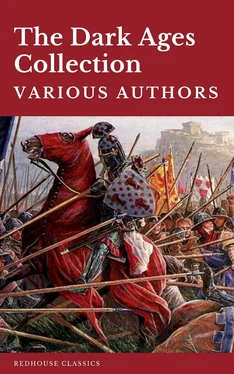Now in those cases where the swelling rose to an unusual size and a discharge of pus had set in, it came about that they escaped from the disease and survived, for clearly the acute condition of the carbuncle had found relief in this direction, and this proved to be in general an indication of returning health… . And with some of them it came about that the thigh was withered, in which case, though the swelling was there, it did not develop the least suppuration. With others who survived the tongue did not remain unaffected, and they lived on either lisping or speaking incoherently and with difficulty. 166This description 167shows that the disease closely resembled in character the terrible oriental plague which devastated Europe and parts of Asia in the fourteenth century. In the case of the Black Death too the chief symptom was the pestboils, but the malady was generally accompanied by inflammation of the lungs and the spitting of blood, which Procopius does not mention. 168
In Constantinople the visitation lasted for four months altogether, and during three of these the mortality was enormous. At first the deaths were only a little above the usual number, but as the infection spread 5000 died daily, and when it was at its worst 10,000 or upward. 169This figures are too vague to enable us to conjecture how many of the population were swept away; but we may feel sceptical when another writer who witnessed the plague assures us that the number of those who died in the streets and public places exceeded 300,000. 170If we could trust the recorded statistics of the mortality in some of the large cities which were stricken by the Black Death — in London, for instance, 100,000, in Venice 100,000, in Avignon 60,000 — then, considering the much larger population of Constantinople, we might regard 300,000 as not an excessive figure for the total destruction. For the general mortality throughout the Empire we have no data for conjecture; but it is interesting to note that a physician who made a careful study of all the accounts of the Black Death came to the conclusion that, without exaggeration, Europe (including Russia) lost twenty-five millions of her inhabitants through that calamity. 171
At first, relatives and domestics attended to the burial of the dead, but as the violence of the plague increased this duty was neglected, and corpses lay forlorn not only in the streets, but even in the houses of notable men whose servants were sick or dead. Aware of this, Justinian placed considerable sums at the disposal of Theodore, one of his private secretaries, 172to take measures for the disposal of the dead. Huge pits were dug at Sycae, on the other side of the Golden Horn, in which the bodies were laid in rows and tramped down tightly; but the men who were engaged on this work, unable to keep up with the number of the dying, mounted the towers of the wall of the suburb, tore off their roofs, and threw the bodies in. Virtually all the towers were filled with corpses, and as a result “an evil stench pervaded the city and distressed the inhabitants still more, and especially whenever the wind blew fresh from that quarter.” 173It is particularly noted that members of the Blue and Green parties laid aside their mutual enmity and co-operated in the labour of burying the dead.
During these months all work ceased; the artisans abandoned their trades. “Indeed in a city which was simply abounding in all good things starvation almost absolute was running riot. Certainly it seemed a difficult and very notable thing to have a sufficiency of bread or of anything else.” 174All court functions were discontinued, and no one was to be seen in official dress, especially when the Emperor fell ill. For he, too, was stricken by the plague, though the attack did not prove fatal. 175
Our historian observed the moral effects of the visitation. Men whose lives had been base and dissolute changed their habits and punctiliously practised the duties of religion, 176not from any real change of heart, but from terror and because they supposed they were to die immediately. But their conversion to respectability was only transient. When the pestilence abated and they thought themselves safe they recurred to their old evil ways of life. It may be confidently asserted, adds the cynical writer, that the disease selected precisely the worst men and let them go free.
Fifteen years later there was a second outbreak of the plague in Constantinople (spring A.D. 558), but evidently much less virulent and destructive. It was noticed in the case of this visitation that females suffered less than males. 177
§ 9. The Conspiracy of Artabanes (A.D. 548)
The Empress Theodora died of cancer of June 28, A.D. 548. 178Her death was a relief to her numerous enemies, but to Justinian it must have been a severe blow. We would give much to have a glimpse into their private life or a record of one of their intimate conversations. We have no means of lifting even a corner of the veil. But it is a significant fact that, though they disagreed on various questions of policy, scandal, which had many evil things to tell of them both, never found any pretext to suggest that they quarrelled or were living on bad terms.
Soon after this event a conspiracy was formed against the Emperor’s life, which had little political significance but created a great sensation because men of his own family were indirectly involved. 179A general named Artabanes, of Armenian race, whom we shall meet as a commander in Africa, had conceived the ambition of marrying the Emperor’s niece Praejecta, but the plan had been thwarted by Theodora, who compelled him to live again with the wife whom he had put away. 180After her death he repudiated his wife for the second time, but Praejecta, who had been given to another, was lost to him, and he bore no goodwill towards the Emperor. His disaffected feelings would not have prompted him to initiate any sinister design, but a kinsman of his, one Arsaces, was animated by a bitter desire of revenge upon Justinian, who, when he was found guilty of a treacherous correspondence with the king of Persia, had ordered him to be scourged lightly and paraded through the streets on the back of a camel. Arsaces fanned into flame the smouldering resentment of Artabanes, and showed him how easy it would be to kill the Emperor, “who is accustomed to sit without guards till late hours in the night, in the company of old priests, deep in the study of the holy books of the Christians.” But perhaps what did most to secure the adhesion of Artabanes was the prospect that Germanus, Justinian’s cousin, and his two sons 181would sanction, if they did not take an active part in, the design.
For Germanus, at this time, had a personal grievance against the Emperor. His brother Boraides had died, leaving almost all his property to Germanus, allowing his daughter to receive only so much as was required by the law. But Justinian, deeming the arrangement unfair, overrode the will in the daughter’s favour. 182relying on the indignation which this arbitrary act had aroused in the family, Arsaces opened communications with Justin, the elder son of Germanus. Having bound him by oath not to reveal the conversation to any person except his father, he enlarged on the manner in which the Emperor ill-treated and passed over his relatives, and expressed his conviction that it would go still harder with them when Belisarius returned from Italy. He then revealed the plan of assassination which he had formed in conjunction with Artabanes and Chanaranges, a young and frivolous Armenian who had been admitted to their counsels.
Читать дальше












